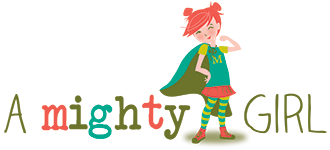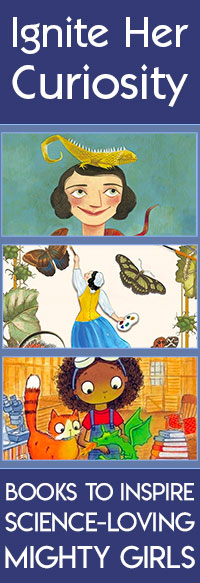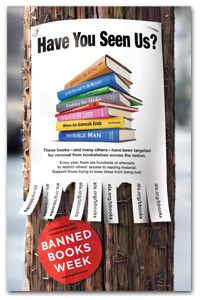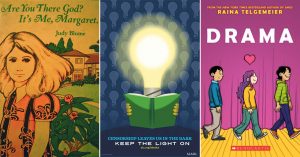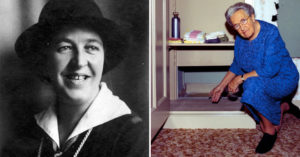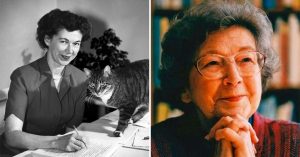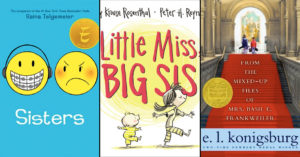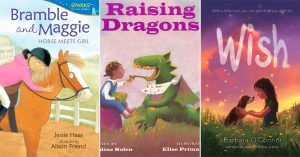A Mighty Girl tribute to Judy Blume in honor of Banned Books Week.
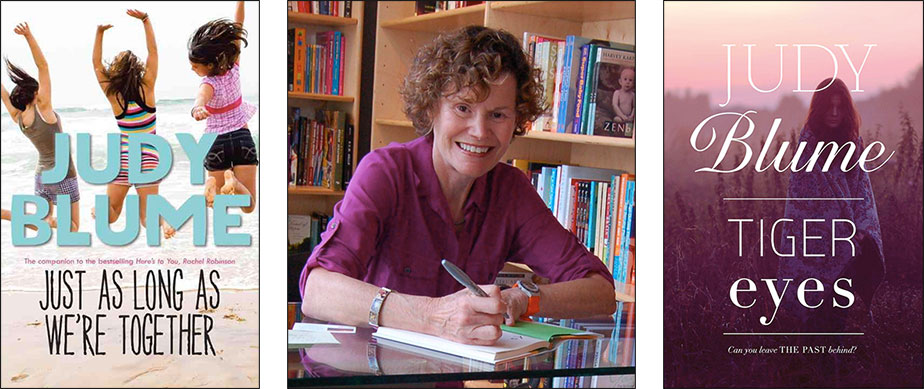 For decades, Mighty Girls have devoured the works of Judy Blume, from Are You There, God? It’s Me, Margaret to Forever... to Just As Long As We’re Together. Her characters are compelling to readers because they face real issues — issues like puberty, struggles with friends, sexuality, divorce, and bullying. There’s even a book, Everything I Needed To Know About Being A Girl I Learned from Judy Blume, which features a collection of essays by twenty-four notable women authors about the impact Judy Blume’s novels have had on their lives and writing.
For decades, Mighty Girls have devoured the works of Judy Blume, from Are You There, God? It’s Me, Margaret to Forever... to Just As Long As We’re Together. Her characters are compelling to readers because they face real issues — issues like puberty, struggles with friends, sexuality, divorce, and bullying. There’s even a book, Everything I Needed To Know About Being A Girl I Learned from Judy Blume, which features a collection of essays by twenty-four notable women authors about the impact Judy Blume’s novels have had on their lives and writing.
But what many Mighty Girl readers may not know is that the very topics that made Blume’s work speak so powerfully to them also made them the subject of frequent challenges and bans. Blume has the dubious distinction of being one of the most banned writers in America. In fact, challenges and bans to her books still happen frequently; as a result, in some towns, it is actually harder for kids to get access to her books now than when they were written.
In the process of defending her books, Blume has emerged as a determined defender of authors’ rights to address controversial issues, even in children’s and young adult literature — and of children's rights to read them. In honor of Banned Books Week, which begins on September 18, A Mighty Girl is proud to present this tribute to Blume’s efforts to ensure that authors, both present and future, don’t have to face censorship as they write for children.
If you’d like to learn more about Mighty Girl books by many authors that have been challenged and banned, check out our blog post Dangerous Words: Challenged and Banned Mighty Girl Books.
“This Is America, We Don’t Have Censorship”
![AYTG-IMM[1]](https://www.amightygirl.com/wp/wp-content/uploads/2014/09/AYTG-IMM1-219x300.jpg) Blume’s experience with censorship and banning of children’s books began early in her career with her 1970 book Are You There, God? It’s Me, Margaret (age 9 - 13). At the time, Blume had already written two books, one of which, Iggie’s House (age 8 - 12), was one of the first books marketed to children to tackle racism and prejudice. But Margaret would rapidly become both a classic and a topic of major debate about what topics are acceptable for children’s literature.
Blume’s experience with censorship and banning of children’s books began early in her career with her 1970 book Are You There, God? It’s Me, Margaret (age 9 - 13). At the time, Blume had already written two books, one of which, Iggie’s House (age 8 - 12), was one of the first books marketed to children to tackle racism and prejudice. But Margaret would rapidly become both a classic and a topic of major debate about what topics are acceptable for children’s literature.
In Banned in the U.S.A.: A Reference Guide to Book Censorship in Schools and Public Libraries, by Herbert N. Foerstel, Blume says that her writing “was not courage. It was naivete. I had absolutely no idea I was writing a controversial book. There was nothing in it that wasn’t a part of my sixth grade experience.” Margaret’s experiences included getting a first bra, having her first period (and wrestling with menstrual products, a sanitary belt in the original and adhesive pads in a more recent update), and starting to feel attracted to boys. The book also tackled jealousy among friends and the tension between the desire to fit in and the desire to speak up about your own opinions.
Blume also captured the complexity of a dual religion family — Margaret’s mother is Christian and her father is Jewish — and Margaret’s search for identity and comfort in belief. Margaret’s relationship with God is a very personal one: “Are you there, God? It's me, Margaret,” she says at one point. “I just did an exercise to help me grow. Have you thought about it, God? About my growing, I mean. I've got a bra now. It would be nice if I had something to put in it.”
![51R7KSQTYJL[1]](https://www.amightygirl.com/wp/wp-content/uploads/2014/09/51R7KSQTYJL1-193x300.jpg) When Are You There, God? It’s Me, Margaret, was challenged for its references to menstruation, puberty, and budding sexuality, as well as for its depiction of religious faith outside of a priest, minister, or rabbi’s guidance, Blume was shocked. Speaking to The Guardian in July 2014 she said, “My feeling in the beginning was wait, this is America: we don't have censorship, we have, you know, freedom to read, freedom to write, freedom of the press, we don't do this, we don't ban books. But then they did.”
When Are You There, God? It’s Me, Margaret, was challenged for its references to menstruation, puberty, and budding sexuality, as well as for its depiction of religious faith outside of a priest, minister, or rabbi’s guidance, Blume was shocked. Speaking to The Guardian in July 2014 she said, “My feeling in the beginning was wait, this is America: we don't have censorship, we have, you know, freedom to read, freedom to write, freedom of the press, we don't do this, we don't ban books. But then they did.”
In her introduction to Places I Never Meant to Be: Original Stories By Censored Writers, which Blume edited, she writes, “When Margaret was published in 1970 I gave three copies to my children's elementary school but the books never reached the shelves. The male principal decided on his own that they were inappropriate for elementary school readers... The stories go on and on but really, I wasn't that concerned. There was no organized effort to ban my books or any other books, none that I knew of, anyway.” But in the 1980s, “censors crawled out of the woodwork, organized and determined. Not only would they decide what their children could read but what all children could read... Suddenly books were seen as dangerous to young minds.”
But in the meantime, Blume had still been writing more of her honest and dangerous books. Unknowingly, she had positioned herself to become the second most banned author in the US — behind only Stephen King — and a champion for complex, provocative children’s literature.
“They Are Corrupting Your Child”: Censorship In Action
More of Blume’s books starring girls, including Deenie (age 12 and up) from 1970, Blubber (age 8 - 12) from 1974, Forever... (age 14 and up), from 1975, and Tiger Eyes (age 12 and up), also ended up in the censor’s crosshairs. All four of these books, along with Margaret, are on the American Library Association’s top 100 frequently challenged and banned books for 1990 to 1999.
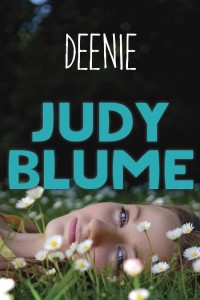 What was Blume writing about that proved to be so controversial? Blubber received challenges for its blunt depiction of bullying in schools, including the fact that the biggest bully in the class receives no consequences for her actions. In Tiger Eyes, the depiction of alcoholism and discussion of depression and suicide are what draw the critics’ ire. But perhaps the most vicious attacks were against books like Deenie and Forever..., which address issues of sex and sexuality, topics that seem guaranteed to evoke challenges.
What was Blume writing about that proved to be so controversial? Blubber received challenges for its blunt depiction of bullying in schools, including the fact that the biggest bully in the class receives no consequences for her actions. In Tiger Eyes, the depiction of alcoholism and discussion of depression and suicide are what draw the critics’ ire. But perhaps the most vicious attacks were against books like Deenie and Forever..., which address issues of sex and sexuality, topics that seem guaranteed to evoke challenges.
1970’s Deenie tells the story of a beautiful girl, an aspiring model, who is suddenly faced with a scoliosis diagnosis. Now confined to a Milwaukee brace for years — as long as it takes to straighten her spine — Deenie wrestles with her own body image and with her sudden awareness of how she has treated people with disabilities in the past. But as Deenie wrestles with these challenges, she is also discovering her body and sexual pleasure. Passages cited as the reason for challenges and bans of this book include “[That week] I touched my special place practically every night. It was the only way I could fall asleep and besides, it felt good.” This, as well as a frank discussion from a gym teacher that calls masturbation “normal and harmless”, have led to the book being called “inappropriate” for child and young adult audiences.
But it was Forever... that earned some of the most vicious criticism, making it Blume’s most censored book. Katherine is sure that her relationship with Michael is the one, her first and only love. The relationship becomes increasingly physical, with Katherine ending up making a trip to Planned Parenthood for a birth control prescription before having sex with Michael. But when they are separated for the summer, Katherine begins to question whether her first love is really a forever love. By the end of the summer, Katherine realizes that first love is special, but it’s rarely the true love of your life.
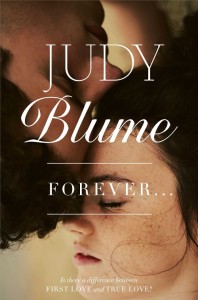 Criticisms leveled against Forever... include everything from sexual immorality to complaints about depicting disobedience to parents. While fans of the book consider Katherine’s scrupulous preparation for first intercourse, including arranging birth control, and Michael’s frank discussion about getting a sexually transmitted infection from a previous sexual partner, as examples of a responsible sexual relationship on both sides, those attributes are exactly the issues that cause the most complaints from parents and schools. When it was removed from a school in Iowa, the reason given was that it “does not promote abstinence and monogamous relationships [and] lacks any aesthetic, literary or social value.”
Criticisms leveled against Forever... include everything from sexual immorality to complaints about depicting disobedience to parents. While fans of the book consider Katherine’s scrupulous preparation for first intercourse, including arranging birth control, and Michael’s frank discussion about getting a sexually transmitted infection from a previous sexual partner, as examples of a responsible sexual relationship on both sides, those attributes are exactly the issues that cause the most complaints from parents and schools. When it was removed from a school in Iowa, the reason given was that it “does not promote abstinence and monogamous relationships [and] lacks any aesthetic, literary or social value.”
Blume had been inspired to write Forever... by her daughter, Randy, to whom the book is dedicated. “She was reading all these books, where a girl succumbed [to sex], she would be punished, sometimes she would die. And Randy said, 'Couldn't there ever be a book where two nice kids do it and nobody has to die?' And I thought 'Yes, I need to write this'.” But this book, and her ongoing support of Planned Parenthood, has had a significant effect on the way she lives her life. Speaking to The Guardian recently, she said, “I went to a couple of places two years ago and I got seven hundred and something hate-mail warnings – 'We know where you are going to be and we'll be there waiting for you', that sort of thing. My publisher sent me with a bodyguard... And nothing happened and probably nothing would have happened, but it was very scary.”
That’s the significant change that Blume has observed in how censorship and book banning happens. In Places I Never Meant To Be, she writes “we had individual parents running into schools, waving books, demanding their removal — books they hadn't read except for certain passages... School administrators sent down the word: Anything that could be seen as controversial had to go. Often books were quietly removed from school libraries and classrooms or, if seen as potential troublemakers, were never purchased in the first place. These decisions were based not on what was best for the students, but what would not offend the censors.”
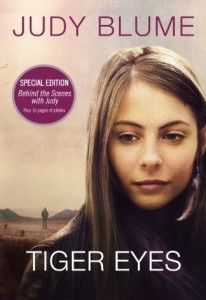 Parent organizations began to form, both locally and nationwide, with the mission of removing books they deemed unsuitable. An example of a censorship group’s attitude comes from Parents Against Bad Books In Schools which reads “they are corrupting your child...You feel the school system is forcing their values (or lack of values) on you and your child. What should you do?” And despite PABBIS’ argument that “Bad is not for us to determine...What each parent considers bad varies and depends on their unique situation, family and values,” they also advocate using challenge procedures for books that you feel are inappropriate, and pursuing the challenge to higher levels if the book isn’t removed by the school.
Parent organizations began to form, both locally and nationwide, with the mission of removing books they deemed unsuitable. An example of a censorship group’s attitude comes from Parents Against Bad Books In Schools which reads “they are corrupting your child...You feel the school system is forcing their values (or lack of values) on you and your child. What should you do?” And despite PABBIS’ argument that “Bad is not for us to determine...What each parent considers bad varies and depends on their unique situation, family and values,” they also advocate using challenge procedures for books that you feel are inappropriate, and pursuing the challenge to higher levels if the book isn’t removed by the school.
Blume writes on her website, “Today, it's not only language and sexuality (the usual reasons given for banning my books) that will land a book on the censors' hit list. It's Satanism, New Age-ism and a hundred other isms, some of which would make you laugh if the implications weren't so serious. Books that make kids laugh often come under suspicion; so do books that encourage kids to think, or question authority; books that don't hit the reader over the head with moral lessons are considered dangerous.”
And in this climate, where books are being pulled not only from school libraries, but public library shelves as well, Blume took on a new role: a leader of the anti-censorship movement, and an advocate for free reading for children.
Fighting Back Against Censorship
Blume has long argued that “censorship grows out of fear....They want to believe that if their children don't read about it, their children won't know about it. And if they don't know about it, it won't happen.” But as she argued at the Hay Festival of Literature and the Arts in June, “A lot of people worry much too much about what their children are reading... If a child picks up a book and reads something she has a question about, if she can go to her parents, great. Or else they will read right over it. It won't mean a thing. They are very good, I think, at monitoring what makes them feel uncomfortable. If something makes them feel uncomfortable they will put it down.”
So with that in mind, Blume has spoken publicly and often about the need to stop censoring children’s literature. In 1999, in an op-ed to the New York Times about attempts to ban Harry Potter, saying “The real danger is not in the books, but in laughing off those who would ban them.... The list of gifted teachers and librarians who find their jobs in jeopardy for defending their students’ right to read, to imagine, to question, grows every year.” Increasingly, she says, “If children are excited about a book, it must be suspect.”
As a result, she writes on her website, “it's not just the books under fire now that worry me. It is the books that will never be written. The books that will never be read. And all due to the fear of censorship. As always, young readers will be the real losers.” She even acknowledges that the fear of censorship has affected her own work: she removed a reference to masturbation in her draft of Tiger Eyes after her editor asked her if leaving it in was worth the risk of readers not having access to the book. In Places I Never Meant To Be, she says, “What effect does this climate have on a writer? Chilling. It’s easy to become discouraged, to second guess everything you write... I’ve never forgiven myself for caving in to editorial pressure based on fear, for playing into the hands of the censors. I knew then it was all over for me unless I took a stand.”
![Judy-Blume[1]](https://www.amightygirl.com/wp/wp-content/uploads/2014/09/Judy-Blume1-300x175.jpg) She found the National Coalition Against Censorship, a coalition of over 40 non-profits dedicated to preventing books from being removed from shelves; learning about NCAC, she says, changed her life. Speaking in Banned in the USA, Blume says, “It’s difficult keeping track of [challenges and bans], because the authors don’t find out unless someone else notifies them. More recently, thanks to the National Coalition Against Censorship, we are hearing more promptly about when and where our books are being banned.” And with the NCAC’s help, people can rally together to stop challenges and show support for authors, teachers, and librarians being criticized for challenged works.
She found the National Coalition Against Censorship, a coalition of over 40 non-profits dedicated to preventing books from being removed from shelves; learning about NCAC, she says, changed her life. Speaking in Banned in the USA, Blume says, “It’s difficult keeping track of [challenges and bans], because the authors don’t find out unless someone else notifies them. More recently, thanks to the National Coalition Against Censorship, we are hearing more promptly about when and where our books are being banned.” And with the NCAC’s help, people can rally together to stop challenges and show support for authors, teachers, and librarians being criticized for challenged works.
She writes, “If no one speaks out for [young readers], if they don’t speak out for themselves, all they’ll get for required reading will be the most bland books available. Instead of finding the information they need at the library, instead of finding novels that illuminate life, they will find only those materials to which nobody could possibly object... In this age of censorship I mourn the loss of books that will never be written, I mourn the voices that will be silenced — writers’ voices, teachers’ voices, students’ voices — and all because of fear.”
So what can you do? Blume has a section on her website devoted specifically to censorship — and how to combat it. In her section What To Do If It Happens To You, she tells kids, teachers and librarians, and authors, some steps they can take if censorship affects a work that they care about. She also provides a resource guide and toolkit, designed in conjunction with NCAC, for dealing with book censorship in schools.
And she sees signs of progress: writing for Index on Censorship magazine during Banned Books Week, she says, “I am encouraged by a new awareness. This year I have received a number of letters from young people who are studying censorship in their classes. And in many communities across the country, students from elementary through to high school are becoming active (along with caring adults) in the fight to maintain their right to read and their right to choose books...Only when readers of all ages become active, only when readers are willing to stand up to the censors, will the censors get the message that they cannot frighten us.”
Additional Recommended Resources
- To learn more about Judy Blume's books starring Mighty Girls, including books like Are You There, God? It's Me Margaret, Deenie, and Forever... that are the frequent target of challenges and bans, visit our Judy Blume collection.
- To learn more about Banned Books Week, and to read lists of frequently challenged and banned books, visit the American Library Association's Banned Books Week website.
- To learn more about Mighty Girl books that have been banned or challenged, check out our blog Dangerous Words: Challenged and Banned Mighty Girl Books.
